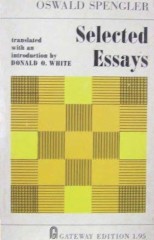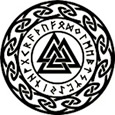
Author : Spengler Oswald
Title : Selected Essays
Year : 1967
Link download : Spengler_Oswald_-_Selected_Essays.zip
Introduction. We leave it to the reader to 'read between the lines' of this critical introduction which appeared with this edition of the Essays. Little remains today of the great international Oswald Spengler vogue of the 1920’s and 1930’s. The title of his two-volume magnum opus, The Decline of the West, 1 crops up now and again in a variety of contexts, but one rarely meets people who have actually read the work or even portions of it. It could be argued, of course, that even in the heyday of the Spenglerian cult the readers of his "outline of a morphology of world history" were few, and those who grasped what it was really about, still fewer. The cult was borne, it seems fair to say, by a widespread hunch that the all too palpable ills of the modern world had been accurately diagnosed by this Teutonic doctor-prophet. Spengler, the man of the perpetual scowl, became a whole generation’s symbol for the futility of human endeavor. While scholars were busy ferreting out the many errors of detail that The Decline of the West contains, news of the book’s somber message reached intellectual and pseudo-intellectual circles in all the Western countries and beyond. To participate in the futility rite it was quite unnecessary to have read the book; the mere mention of Spengler’s name sufficed to express a whole mood of resignation in the face of the impersonal cruelty of history. The reasons for the eventual passing of the Spengler cult are, I think, readily apparent. It is not that the historical methodology demonstrated in The Decline of the West has been conclusively judged fallacious or outmoded; historians and philosophers of history still attend to the developmental and "morphological" problems that the book presents, and, while unqualified assent is rare among the professionals, Spengler continues to be a respectable subject for scholarly inquiry. Nor is it true that the intellectual mood in the Western world has changed so fundamentally from that of thirty and forty years ago as to preclude an audience for Spengler’s message. If anything, the pessimism, genuine or feigned, that put his name on thousands of lips in the twenties and thirties has increased rather than subsided since his death. The modern totalitarian state, World War II, the emergence of Soviet Russia as a major world power, the ever more rapid advance of technology - all of which he (however vaguely) foresaw and predicted in his writings - ought to have assured his continued relevance in the Nuclear Age. Aside from the appearance of other writers of imaginative power who have replaced him as spokesmen for the predicament of modern man, a number of external events have obscured Spengler’s significance for the past thirty years. There is, first of all, the fact of his death in 1936, at a time when the regime in his own country had effectively muzzled him and when the remainder of the Western world had once again begun to suspect all things German. Spengler’s disagreement with the National Socialist dictatorship, documented in his booklet Years of Decision (published in the summer of 1933), evoked a government ban on the mention of his name in the German press, and caused Spengler, already a physically broken man, to join the rank of the "inner emigration." Abroad, the image of the brooding Geschichtsphilosoph became linked with the frightening display of political cynicism personified by Hitler, the "new Caesar." The irony of this mistaken image has never been fully realized, despite the efforts of scholars in Germany and elsewhere to recount and explain the last years of Spengler’s life to postwar readers. In fact, little has ever been known outside of Germany of Spengler’s active concern with contemporary politics from the time of publication of The Decline of the West to his death almost twenty years later. Judging from the paucity of translations of his shorter writings, one is inclined to conclude that the world was content with the notion of Spengler as the hermit genius, the Great Mind who stood utterly aloof from his time and society in order to formulate inspired and profound theories of universal history. Perhaps the present selection of essays and speeches will help to alter this oversimplified portrait. Once the overwhelming success of the first volume of The Decline of the West had become apparent, Spengler was frequently asked to write or speak on historical and political subjects. The prediction of future developments was, after all, part of the method propounded in The Decline of the West. Cultures, he had theorized there, had risen and fallen in the past; once it is established precisely where our own contemporary Western culture stands within the recurring pattern of birth, flowering, and decay, it will be possible to foretell, at least in general terms, the course of history in the time that remains at our disposal. Thus, when consulting him for pronouncements on future events and trends, the countless German and foreign clubs, newspapers, institutions, and individuals were in effect simply taking him at his word, and there is some evidence, in his correspondence as well as in the pronouncements themselves, that he was not entirely displeased by his role of popular oracle. And, like all famous oracles, he was most often deliberately vague and ambiguous when telling the future. ...

Davis James Kirkpatrick - Spying on America
Author : Davis James Kirkpatrick Title : Spying on America The FBI's domestic counter-intelligence...














